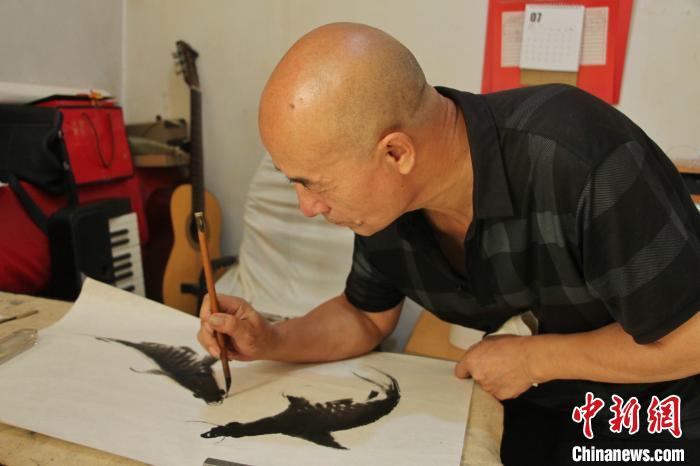China's 'Charlie Chaplin' bridges cultures
- By Song Haozhe and Zhang Rui
 0 Comment(s)
0 Comment(s) Print
Print E-mail China.org.cn, August 13, 2020
E-mail China.org.cn, August 13, 2020
Wang Hua, a veteran Chinese performer and regular Charlie Chaplin impersonator, mixes the comedic clown style of China's Peking Opera with Western mime.

Wang, an elder man who lives in Jinan, Shandong province, brings happiness to local residents by imitating Chaplin's iconic image and appearing on the stage or street, performing Chaplin's classic moves and his own pantomime sketches.
His unique style is the result of 38 years of practice and hard work.
Unlike others who imitate Chaplin completely, Wang adds elements of the traditional Chinese Peking Opera in his imitation. He absorbs the essence of Chinese opera and integrates it into European comedy art. This is a magical combination of "Western pantomime and Chinese clowns".
Wang started his career as a magician and was inspired by Chaplin's image when he saw him in an outdoor film by chance. After that, he bought Chaplin's clothes and started trying to imitate him.
"Many years ago, I was a magician. At one time, I happened to see Chaplin on an outdoor screen and I became fascinated by him," Wang told China News Service on Aug. 5. Afterwards, he bought a similar costume to Chaplin and many friends praised his impersonations.
In that era, TV was not yet a household appliance in China, so Wang often went to different villages to watch more of Chaplin's films in open air screenings. Later he bought various Chaplin performances on VHS and repeatedly studied them. "There are no shortcuts to imitation. I must go over every detail over and over again," he said.
"Chaplin's iconic duck walk is the most difficult to imitate, requiring total coordination. You have to both exaggerate and be funny. After six months of practice, I thought I had mastered it, but after two years, I still felt inadequate," Wang recalled. "I didn't really master it until after ten years of practice."
Wang can't forget the first time when he performed Chaplin, as everyone applauded him. Sometimes he would still make mistakes during the performance but he could quickly make up for it with other movements.
Wang first learned magic and imitated Chaplin for fun, as well as making a living from it. But this was not what he ultimately wanted to achieve, so in later performances, he paid more attention to spiritual enrichment and artistic cultivation.

Wang also keeps learning painting, musical instrument playing, and other skills, and constantly tries to add new styles to his traditional pantomime performance. "I don't want to just imitate Chaplin," Wang said. "I want to use my accumulated experience to add new innovations to my imitation."
Art is interlinked, and traditional art can be blended with modern forms, he added.
Wang believes many young people nowadays are pursuing dreams of becoming pop stars, while showing no interest in traditional arts such as Peking Opera and mime. Even Chaplin is forgotten by many people. However, he still believes that the true art will survive the test of time. "Classics are always classics. Adding new elements to traditional arts will keep them popular," he said.
He also wants to advise young people to get in touch with traditional and timeless art, from which they can get inspiration about life and creation.






Go to Forum >>0 Comment(s)